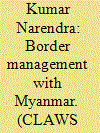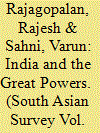|
|
|
Sort Order |
|
|
|
Items / Page
|
|
|
|
|
|
|
| Srl | Item |
| 1 |
ID:
131026


|
|
|
|
|
| Publication |
2014.
|
| Summary/Abstract |
Neighbouring states are most relevant in foreign policy' and Myanmar, indeed, has strategic, economic, cultural and religious signi?cance for India. Myanmar is not where only China and India 'meet'; it is also the intersection between South Asia and Southeast Asiaz. It is a gateway to South Asia and a land bridge to the Association for Southeast Asian Nations (ASEAN). It is an opportunity and also brings with it a certain amount of vulnerabilities as well. Myanmar has huge potential for meeting India's energy requirement and for markets for Indian consumer goods; in return, India can contribute immensely in the field of infrastructure development, communication, education, tourism industry, science and technology. India and Myanmar are historically linked to each other through religion, people-to-people contact and sharing ethnically identical populations on both sides of the borders. The porous land borders of India and Myanmar are a cause of concern for peace, stability and economic development. Inhospitable terrain and an underdeveloped border region provide an ideal platform for insurgents, non-state actors, drugs and weapons traffickers to operate and spread their network
|
|
|
|
|
|
|
|
|
|
|
|
|
|
|
|
| 2 |
ID:
084871


|
|
|
|
|
| Publication |
2008.
|
| Summary/Abstract |
Six propositions drive this article. First, India's relations with the great powers as they evolve over the next two decades are going to be conditioned by India's own emergence as a great power. Second, it will take at least 15 to 20 years for a balance to re-emerge in the contemporary hegemonic system; hence, India's emergence will be simultaneous with the relative decline of the United States (US). Third, Indian policy makers and analysts need to think structurally about India's external relations, especially with the US and China. Fourth, India's relations with the great powers are inseparable from the broader issue of emerging Asian balances and security architectures. Fifth, India needs to keep a keen eye on other major powers, among whom Russia, Japan, the European Union (EU) and Brazil will be particularly important. Finally, while building its capabilities along a broad spectrum, India must not lose sight of the normative component that is inherent in great power status.
|
|
|
|
|
|
|
|
|
|
|
|
|
|
|
|
|
|
|
|
|